Baileyharvey
On this page, you find all documents, package deals, and flashcards offered by seller baileyharvey.
- 21
- 2
- 4
Community
- Followers
- Following
28 items
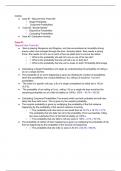
Unit #10: Statistical Inference
Outline Case #1: “Beyond Here There Be” Single Probability Conjoined Probabilities Case #2: “Buzzer Beater” Disjunctive Possibilities Computing Probabilities Case #3: Graduation Anxiety
- Package deal
- Class notes
- • 3 pages •
Outline Case #1: “Beyond Here There Be” Single Probability Conjoined Probabilities Case #2: “Buzzer Beater” Disjunctive Possibilities Computing Probabilities Case #3: Graduation Anxiety
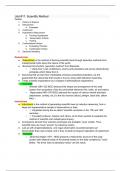
Unit #11: Scientific Method
Unit #11: Scientific Method - Deductivism and inductivism are methods used in the scientific method. - Deductivism involves deriving scientific laws through deductive methods from metaphysical truths. - Examples of deductivism include Aristotle deducing the shape of the solar system and Hippocrates deducing the causes of mental disorders. - Inductivism involves generating scientific laws through inductive reasoning from observations or data. - Examples of inductivism include Johannes Kepler...
- Package deal
- Class notes
- • 6 pages •
Unit #11: Scientific Method - Deductivism and inductivism are methods used in the scientific method. - Deductivism involves deriving scientific laws through deductive methods from metaphysical truths. - Examples of deductivism include Aristotle deducing the shape of the solar system and Hippocrates deducing the causes of mental disorders. - Inductivism involves generating scientific laws through inductive reasoning from observations or data. - Examples of inductivism include Johannes Kepler...
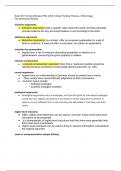
Exam #3: Format & Review PHIL 2303: Critical Thinking Thomas J. Brommage Fall 2023 Exam Review
The third exam for PHIL 2303: Critical Thinking, taught by Thomas J. Brommage, will cover various topics related to critical thinking. Inductive arguments are claims about the world that provide evidence for why we should believe or act according to the claim. On the other hand, abductive arguments offer proposed explanations for a set of facts or evidence. Induction by enumeration involves generalizing from a set of instances describing properties or relations. Reductio ad absurdum argues again...
- Package deal
- Class notes
- • 4 pages •
The third exam for PHIL 2303: Critical Thinking, taught by Thomas J. Brommage, will cover various topics related to critical thinking. Inductive arguments are claims about the world that provide evidence for why we should believe or act according to the claim. On the other hand, abductive arguments offer proposed explanations for a set of facts or evidence. Induction by enumeration involves generalizing from a set of instances describing properties or relations. Reductio ad absurdum argues again...
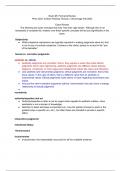
Exam #5: Format & Review PHIL 2303: Critical Thinking Thomas J. Brommage Fall 2023
Exam #5: Format & Review PHIL 2303: Critical Thinking Thomas J. Brommage Fall 2023 The following concepts are important for the upcoming exam: 1. Subjectivity: While art judgments are subjective, they are not entirely subjective. Beauty is not solely in the "eye of the beholder." 2. Factual vs. Normative Judgments: Aesthetic and ethical judgments are normative, but they use different values. Ethical judgments involve moral blame and praise. 3. Authority/Expertise and Art: Authorit...
- Package deal
- Class notes
- • 5 pages •
Exam #5: Format & Review PHIL 2303: Critical Thinking Thomas J. Brommage Fall 2023 The following concepts are important for the upcoming exam: 1. Subjectivity: While art judgments are subjective, they are not entirely subjective. Beauty is not solely in the "eye of the beholder." 2. Factual vs. Normative Judgments: Aesthetic and ethical judgments are normative, but they use different values. Ethical judgments involve moral blame and praise. 3. Authority/Expertise and Art: Authorit...
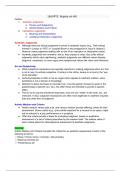
Unit #12: Inquiry on Art
Unit #12: Art Inquiry This unit focuses on aesthetic judgments, privacy, subjectivity, artistic medium, interpretive judgments, meaning, and justifying interpretive judgments. Aesthetic judgments are evaluative or interpretive, expressing values like beauty, elegance, complexity, vision, and influence. While subjective impressions play a role, authority/expertise is not as important in aesthetics. Artistic medium varies, and different criteria are used for assessment. The exercise involves cons...
- Package deal
- Class notes
- • 2 pages •
Unit #12: Art Inquiry This unit focuses on aesthetic judgments, privacy, subjectivity, artistic medium, interpretive judgments, meaning, and justifying interpretive judgments. Aesthetic judgments are evaluative or interpretive, expressing values like beauty, elegance, complexity, vision, and influence. While subjective impressions play a role, authority/expertise is not as important in aesthetics. Artistic medium varies, and different criteria are used for assessment. The exercise involves cons...
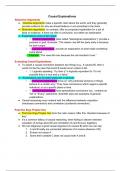
Unit 7 Causal Explanations
Causal explanations are different from inductive arguments as they provide explanations rather than conclusions. There are two types of explanations: reason explanations and causal explanations. Reason explanations provide a purpose or goal, while causal explanations explain what caused something to happen. When evaluating causal explanations, it is important to consider the difference between causation and correlation. A fallacy of causal reasoning is Post Hoc Ergo Propter Hoc, which fails to d...
- Package deal
- Class notes
- • 2 pages •
Causal explanations are different from inductive arguments as they provide explanations rather than conclusions. There are two types of explanations: reason explanations and causal explanations. Reason explanations provide a purpose or goal, while causal explanations explain what caused something to happen. When evaluating causal explanations, it is important to consider the difference between causation and correlation. A fallacy of causal reasoning is Post Hoc Ergo Propter Hoc, which fails to d...
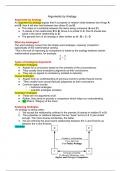
Unit 6 Arguments by Analogy
Arguments by Analogy are based on the idea that if a certain property or relation exists between two things (A and B), it will also exist between two other things (C and D) that share a similarity with A. Analogies are often expressed as A : B :: C : D. There are different types of analogical arguments, including Precedent Analogies that rely on similarities in circumstances, Causal Analogies that predict future events based on previous ones, and Illustrative Analogies that provide comparisons t...
- Package deal
- Class notes
- • 2 pages •
Arguments by Analogy are based on the idea that if a certain property or relation exists between two things (A and B), it will also exist between two other things (C and D) that share a similarity with A. Analogies are often expressed as A : B :: C : D. There are different types of analogical arguments, including Precedent Analogies that rely on similarities in circumstances, Causal Analogies that predict future events based on previous ones, and Illustrative Analogies that provide comparisons t...
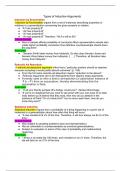
Unit 5 Types of Inductive Arguments
There are four types of inductive arguments: Induction by Enumeration, Reductio Ad Absurdum, Statistical Induction, and Higher-level Induction. Induction by Enumeration argues from specific instances to a generalization. Reductio Ad Absurdum argues against a position by showing it leads to absurd outcomes. Statistical Induction infers generalizations based on the probability of a thing happening. Higher-level Induction uses more general inferences to overrule lower-level ones. Examples are provi...
- Package deal
- Class notes
- • 2 pages •
There are four types of inductive arguments: Induction by Enumeration, Reductio Ad Absurdum, Statistical Induction, and Higher-level Induction. Induction by Enumeration argues from specific instances to a generalization. Reductio Ad Absurdum argues against a position by showing it leads to absurd outcomes. Statistical Induction infers generalizations based on the probability of a thing happening. Higher-level Induction uses more general inferences to overrule lower-level ones. Examples are provi...
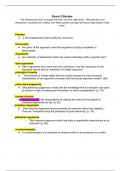
Exam 2 Review PHIL 2303
This text provides a review of concepts that may be encountered in Exam 2. It discusses the premise as a set of statements that justify the conclusion and the conclusion as the main point of the argument. Arguments are collections of statements used to justify a specific point, and sub-arguments can have multiple conclusions, serving as premises for larger arguments. The principle of charity suggests choosing the most favorable interpretation of an argument. Prima facie judgments are tentative a...
- Package deal
- Class notes
- • 4 pages •
This text provides a review of concepts that may be encountered in Exam 2. It discusses the premise as a set of statements that justify the conclusion and the conclusion as the main point of the argument. Arguments are collections of statements used to justify a specific point, and sub-arguments can have multiple conclusions, serving as premises for larger arguments. The principle of charity suggests choosing the most favorable interpretation of an argument. Prima facie judgments are tentative a...
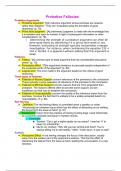
Chapter 4 Probative Fallacies
Probative argument is an inductive argument evaluated using the principles of good reasoning, as it uses reasons rather than statistics. The strength of a probative argument can be easily determined as weak or not based on prima facie judgment, which is a preliminary judgement made with the knowledge that it is tentative and open to revision. Determining the strength typically requires a deeper investigation. Probative fallacies are common types of weak arguments that have considerable persuasiv...
- Package deal
- Class notes
- • 9 pages •
Probative argument is an inductive argument evaluated using the principles of good reasoning, as it uses reasons rather than statistics. The strength of a probative argument can be easily determined as weak or not based on prima facie judgment, which is a preliminary judgement made with the knowledge that it is tentative and open to revision. Determining the strength typically requires a deeper investigation. Probative fallacies are common types of weak arguments that have considerable persuasiv...
